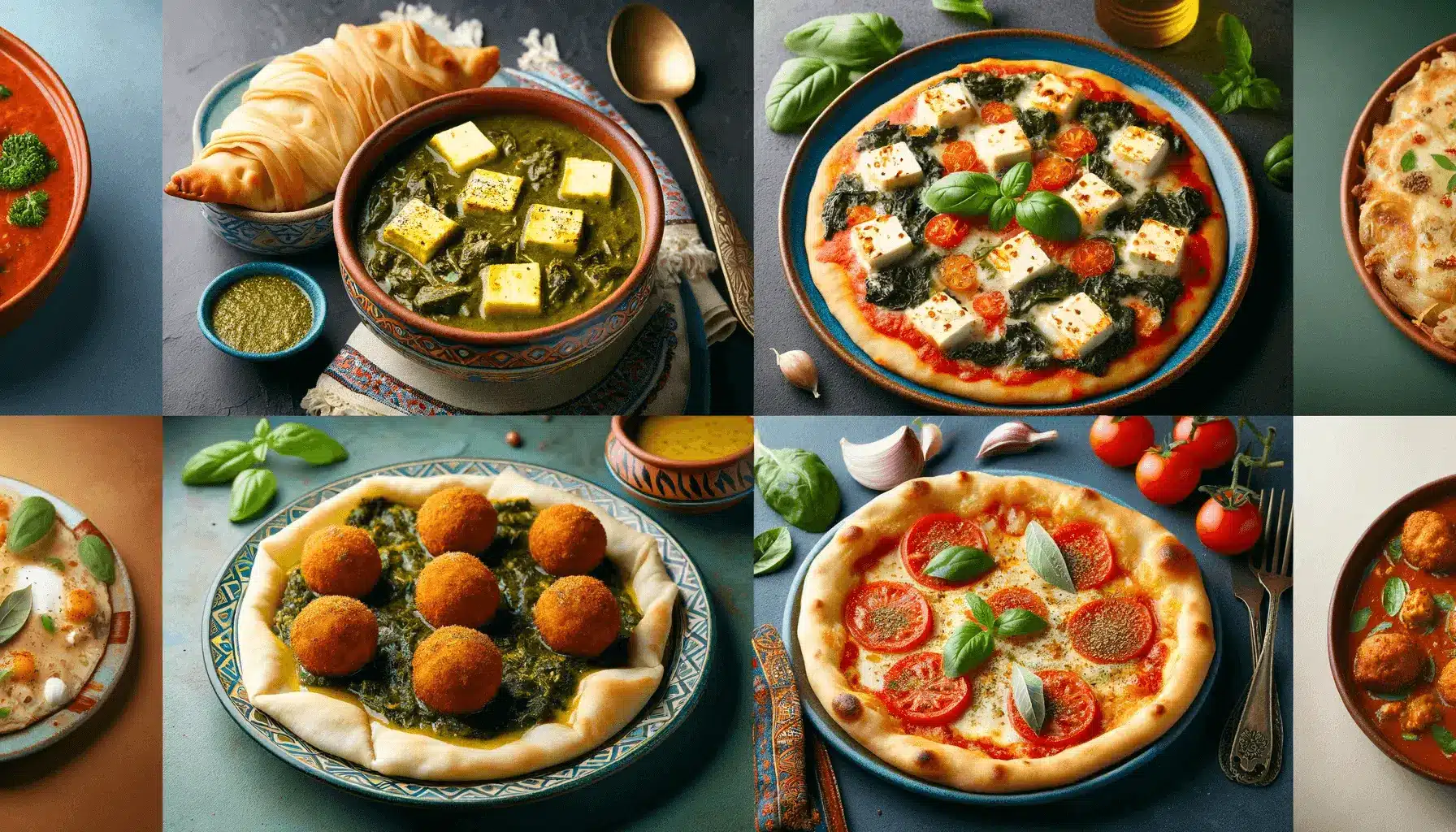Introduction to The Most Famous Vegetarian Dishes
In a world where culinary diversity is as rich as its cultures, vegetarian cuisine stands out with its vibrant flavors and health benefits. This article delves into the realm of Famous Vegetarian Dishes, exploring the most renowned ones globally, their nutritional value, cultural significance, and addressing common queries. From the streets of India to the heart of Italy, we embark on a gastronomic journey to discover the essence of Famous Vegetarian Dishes across the globe.
Introduction to Global Vegetarian Dishes
Vegetarian cuisine, a mosaic of flavors and traditions, offers a unique window into the world’s diverse cultures. It’s not just about eliminating meat; it’s a celebration of plant-based creativity and culinary innovation in Famous Vegetarian Dishes.
The Rise of Vegetarianism
In recent years, vegetarianism has blossomed from a niche dietary choice into a mainstream lifestyle. Health-conscious individuals, environmental advocates, and animal rights supporters are increasingly embracing a vegetarian diet. This shift is not just a trend but a profound change in how we view and consume food.
Diversity in Vegetarian Cuisine
The beauty of vegetarian cuisine lies in its astonishing variety. Each region of the world brings its own unique ingredients, cooking techniques, and flavors to the table, creating a rich tapestry of Famous Vegetarian Dishes that tantalize the taste buds. From the spicy curries of India to the hearty stews of Europe, vegetarian dishes offer a delightful experience that caters to every palate.
Famous Vegetarian Dishes Around the World
The world of vegetarian cuisine is as diverse as it is delicious. Let’s embark on a culinary tour to discover some of the most renowned Famous Vegetarian Dishes from various corners of the globe.
Youtiao – China
In China, where meat is often a staple, Youtiao stands out as a beloved vegetarian option. These deep-fried breadsticks, typically enjoyed for breakfast or as a snack, are a testament to the simplicity and elegance of Chinese vegetarian cooking. Soft, slightly salted, and often paired with soy milk or rice congee, Youtiao offers a delightful start to the day.
Bolon de Verde – Ecuador
Heading to South America, Bolon de Verde from Ecuador challenges the meat-centric stereotypes of the region. This hearty dish, a large ball of fried plantain filled with fresh cheese, is a testament to the creativity of vegetarian cuisine in a predominantly meat-focused culinary landscape.
Tartiflette au Reblochon – France
In France, the Tartiflette au Reblochon is a vegetarian’s dream. Combining potatoes, onions, reblochon cheese, spices, and white wine, this dish is a warm, comforting embrace of French culinary traditions, proving that vegetarian dishes can be just as indulgent and satisfying as their meat-based counterparts.
Gado Gado – Indonesia
Indonesia’s Gado Gado is a vibrant testament to the country’s rich culinary diversity. This dish, a mix of potatoes, tofu, hard-boiled egg, green beans, and carrots, all smothered in a delicious peanut sauce, showcases the balance and harmony of Indonesian flavors.
Masala Dosa – India
India, a haven for vegetarians, offers an array of dishes, with Masala Dosa being a standout. This South Indian specialty, a crepe-like dish made from fermented rice and lentil batter, filled with curried potatoes and peas, is a perfect example of the intricate flavors and textures in Indian vegetarian cuisine.
Pesto Trofie – Italy
Italy’s Pesto Trofie is a celebration of simplicity and flavor. This dish, featuring a type of pasta tossed in a rich, basil-based pesto sauce, embodies the essence of Italian cooking, where a few quality ingredients come together to create something truly extraordinary.
Doenjang Jjigae – South Korea
In South Korea, Doenjang Jjigae, a soybean paste stew, offers a warm and comforting vegetarian option. Packed with tofu, mushrooms, and bean sprouts, this dish is a hearty and flavorful representation of Korean vegetarian cooking.
Vegetable Momos and Dal Bhat – Nepal
Nepal’s Vegetable Momos and Dal Bhat are staples for any vegetarian traveler. The momos, delicious dumplings filled with vegetables, and Dal Bhat, a combination of lentil soup and rice, reflect the simplicity and heartiness of Nepalese cuisine.
Vegetarian Tam Ponlamai – Thailand
In Thailand, where fish sauce is ubiquitous, the Vegetarian Tam Ponlamai, a refreshing fruit salad, stands out. Dressed in lime juice, chilies, soy sauce, and peanuts, this dish is a burst of flavors, showcasing the Thai knack for balancing sweet, sour, spicy, and savory.
Vinegret – Ukraine
Lastly, Ukraine’s Vinegret is a colorful and nutritious salad made from beetroots, potatoes, carrots, pickles, and sauerkraut. This dish is a testament to the resourcefulness and richness of Eastern European vegetarian cuisine.
Health and Cultural Aspects
Health Benefits and Cultural Significance
Vegetarian cuisine is more than a mere collection of dishes; it’s a fusion of health benefits and cultural heritage. Let’s explore the nutritional value and cultural importance of vegetarian dishes.
Nutritional Value of Famous Vegetarian Dishes
Vegetarian dishes are not just about tantalizing your taste buds; they’re a powerhouse of nutrition. These dishes are rich in vitamins, minerals, and fiber. They are often lower in calories and saturated fats, contributing to a balanced diet. For example, Doenjang Jjigae’s protein-rich tofu and Dal Bhat’s fiber-packed lentils support a healthy lifestyle. Including these dishes in your diet boosts heart health, aids weight management, and reduces chronic disease risks.
Cultural Importance in Different Regions
Each vegetarian dish carries a piece of cultural identity. Take, for instance, Masala Dosa, which is more than a beloved South Indian dish; it embodies the region’s culinary heritage, showcasing centuries of tradition and local flavors. Similarly, Pesto Trofie epitomizes Northern Italy’s culinary creativity, where basil and olive oil are essential ingredients. These dishes represent not just sustenance but a celebration of cultural diversity and history.
Frequently Asked Questions
Common Queries About Vegetarian Dishes
In this section, we address some of the most common questions and misconceptions about vegetarian cuisine, providing insights that might surprise and enlighten you.
Is vegetarian food less flavorful than non-vegetarian dishes?
Absolutely not! Vegetarian dishes, like Gado Gado with its rich peanut sauce or the spicy Masala Dosa, are bursting with flavors. The use of herbs, spices, and fresh ingredients ensures a taste experience that is often more complex and layered than many meat-based dishes.
Can vegetarian dishes provide enough protein?
Yes, they can! Many vegetarian dishes are rich in protein. For instance, Doenjang Jjigae contains tofu, a great source of plant-based protein, while lentils in Dal Bhat are also high in protein.
Are vegetarian dishes healthier than meat-based dishes?
Generally speaking, vegetarian dishes are often lower in saturated fat and higher in fiber, contributing to their health benefits. Nonetheless, it’s crucial to maintain a balanced diet, regardless of whether it includes meat or not.
How do famous vegetarian dishes vary across different cultures?
Every culture brings its unique twist to vegetarian cuisine. For example, Mediterranean dishes like Pesto Trofie focus on fresh, simple ingredients, while Asian cuisines, such as in Vegetarian Tam Ponlamai, often balance a variety of flavors like sweet, sour, and spicy.
Can switching to vegetarian dishes help the environment?
Yes, adopting a vegetarian diet can have a positive impact on the environment. It typically requires less water and land and produces fewer greenhouse gases compared to a meat-based diet.
Addressing Misconceptions
Do vegetarian dishes lack variety? On the contrary, vegetarian cuisine offers a vast array of options. From the hearty Vinegret salad of Ukraine to the comforting Bolon de Verde from Ecuador, the variety is endless.
Is it hard to cook vegetarian dishes?
Not at all! Many vegetarian dishes are quite simple to prepare. Dishes like Youtiao and Tartiflette au Reblochon require basic ingredients and straightforward cooking methods.
Can vegetarians enjoy international cuisine?
Absolutely! As our culinary tour shows, every corner of the world has its vegetarian gems, from the streets of India to the bistros of France.
Conclusion
Embracing Famous Vegetarian Dishes Globally
In concluding our journey through the rich and varied world of vegetarian cuisine, it becomes evident that this eating style transcends mere trendiness. Indeed, it’s a sustainable, healthful, and delicious lifestyle choice gaining worldwide popularity.
The Future of Vegetarianism
The future of vegetarianism looks bright and promising. With increasing awareness of health, environmental concerns, and animal welfare, more people are exploring vegetarian options. The culinary world is responding with innovative dishes that make plant-based eating an exciting adventure. The evolution of dishes like Masala Dosa and Pesto Trofie reflects a global shift towards more ethical and health-conscious eating habits.
Personal Reflections and Recommendations
Embracing vegetarian cuisine opens up a world of new flavors, textures, and experiences. Whether it’s the comforting warmth of a Tartiflette au Reblochon or the zesty freshness of a Vegetarian Tam Ponlamai, there’s a vegetarian dish to suit every palate. I encourage everyone to explore the rich tapestry of vegetarian dishes from around the world. It’s not just about eating healthily; it’s about discovering new cultures, traditions, and stories through food.
For more insights into the benefits of a vegetarian diet, consider exploring resources like the World Health Organization and the International Vegetarian Union. These platforms offer valuable information and support for anyone interested in vegetarianism.
In summary, the world of vegetarian cuisine is a testament to the creativity and diversity of global culinary traditions. It offers a delicious, nutritious, and sustainable alternative to meat-based diets, with a rich array of dishes that cater to every taste and preference.
As we delve deeper into these dishes, we not only feed our bodies but also connect with the cultures and traditions behind them. This exploration enriches our understanding and appreciation of global cuisines. Vegetarian cuisine, in all its glory, is a celebration of life, health, and the endless possibilities of plant-based cooking.


14 thoughts on “Famous Vegetarian Dishes: Exploring Global Culinary Delights”